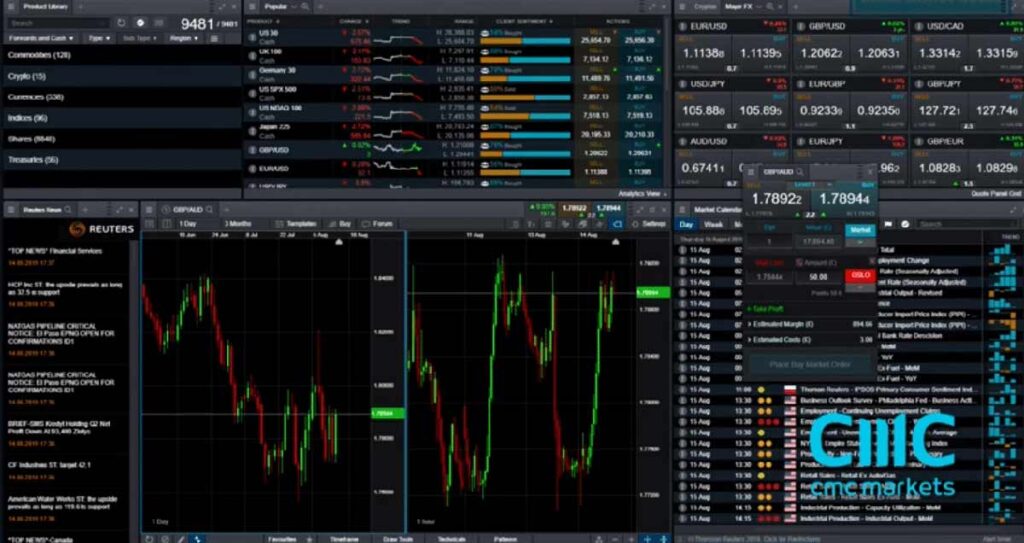Contracts for Difference (CFDs) are financial instruments that allow you to profit from the price movements of a security without owning the underlying security itself. Popular with traders, they can be used to trade a wide range of assets.
Here, we will highlight the most popular markets for CFD traders in Australia. We also look at some other ways Australian traders can trade the world’s financial markets.
Most popular markets for Australian CFD traders
Stocks
Stocks are always popular with Australian CFD traders as CFDs are available for a wide range of securities.
Trading stocks via CFDs has several advantages over traditional forms of stock investing. For a start, you can potentially profit from both share price increases and share price decreases.
Secondly, you can use leverage to increase your exposure to the stock. Leverage for stocks is capped at a ratio 5:1 in Australia, however.
On the downside, losses can be significant if you are using leverage and your trades go against you.
Forex
The foreign exchange (forex) market is the largest financial market in the world, with around $5 trillion traded every day. So, it’s popular with CFD traders in Australia.
One advantage of trading forex with CFDs is that you don’t need to have a lot of money to start trading. For example, with Pepperstone, there is no minimum deposit. This means that small investors can easily enter the market.
Another is that trade size can be magnified significantly with leverage. In Australia, traders can use leverage of up to 30:1 for major currency pairs such as the EUR/USD and 20:1 for minor currency pairs such as EUR/AUD. This means that a small deposit can go a long way. Using leverage adds risk, however.
Indices
Indices such as the S&P/ASX200 and the S&P 500 are closely followed in the financial world. However, it’s not possible to invest in them directly. So, CFDs are an effective way to gain exposure to them.
Trading indices is a popular strategy because indices are constantly moving up and down. This means that there are always opportunities for traders to capitalise on.
Meanwhile, trading indices is less hassle – and potentially less risky – than trading individual stocks. With indices trading, you don’t need to worry about studying individual companies’ reports and financials. And you’re less exposed to individual company risks because you are trading a basket of stocks.
Commodities
Commodities are popular with CFD traders due to the fact that commodity prices tend to be quite volatile. The high level of volatility across the asset class creates plenty of trading opportunities.
Commodities trading is also popular because commodities tend to have low correlations to traditional asset classes such as shares and bonds. For example, gold, which is seen as a ‘safe-haven’ asset, often rises during periods of economic uncertainty when share prices are falling. This means that commodities can be used by CFD traders to hedge risks.
What are some alternatives to CFDs?
While CFDs are an effective way of capitalising on the price movements of assets and securities, there are a number of other financial products that can be used as an alternative. These include:
Futures
Futures are standardised contracts that enable traders to purchase or sell an asset at a predetermined future date and price. Futures differ from CFDs in several ways:
- Futures contracts have predetermined expiration dates while CFDs do not.
- Futures contracts can be used to trade indices, currencies, commodities, and bonds. CFDs can be used to trade all of these assets as well as stocks, ETFs, and more.
- With futures you will own the assets if you choose physical settlement. With CFDs, you will never own the underlying assets.
- Futures contracts are traded on stock exchanges while CFDs are not.
- Futures are standardised in lots. By contrast, CFDs can be traded in a range of sizes.
To trade futures in Australia, you will need an account with a broker that offers future trading such as Saxo.
ETFs
Exchange-traded funds (ETFs) are investment funds that aim to track the performance of a specific stock market index or asset. They are traded on the stock market meaning that they can be purchased and sold just like regular stocks.
There are ETFs available for virtually every asset class today, including stocks, bonds, and commodities. Some examples of ETFs include:
- The BetaShares Australia 200 ETF (ASX:A200), which tracks the performance of the S&P/ASX200 index.
- The iShares S&P 500 ETF (ASX:IVV), which tracks the performance of the S&P 500 index.
- The Global X Physical Gold ETF (ASX:GOLD), which tracks the price of gold.
To buy or sell an ETF, you will need an account with a broker.
Individual stocks
Investing in stocks directly is an alternative to trading CFDs on stocks.
The advantage of investing directly in stocks is that you own the underlying stocks. With CFD trading, you do not actually own the stocks you are trading.
On the downside, when investing directly, it’s not possible to use leverage or trade in both directions.
Who regulates CFD trading in Australia?
In Australia, CFD trading is regulated by the Australian Securities and Investments Commission (ASIC). It’s worth noting that in 2021, ASIC put some new regulations in place to protect investors. These included limits on how much leverage traders can use when trading CFDs.

Based in London, Edward is a distinguished investment writer with an extensive client portfolio comprising a diverse array of prominent financial services firms across the globe. With over 15 years of hands-on experience in private wealth management and institutional asset management, both in the UK and Australia, he possesses a profound understanding of the finance industry.
Before establishing himself as a writer, Edward earned a Commerce degree from the prestigious University of Melbourne. Complementing his academic background, he holds the esteemed Investment Management Certificate (IMC) and is a proud holder of the Chartered Financial Analyst (CFA) qualification.
Widely recognised as a sought-after investment expert, Edward’s insightful perspectives and analyses have been featured on sites such as BlackRock, Credit Suisse, WisdomTree, Motley Fool, eToro, and CMC Markets, among others.
To contact Ed, please see his Invesdaq profile.

